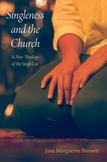Taking single life in the church seriously
In Singleness and the Church, Jana Bennett reflects theologically on the diverse realities of single life today and finds liberating resources from the Christian tradition that challenge single people’s experiences of invisibility within or exclusion from church life today. Defining singleness very broadly, including “never married, single parent, engaged, divorced, widowed, cohabiting, and same-sex attracted and single,” Bennett challenges all Christians to take singleness seriously as part of what it means to be a Christian community. She resists any privileging of ordained, married or vowed religious life as a holier state of life than singleness and instead invites all Christians to consider what it might mean to seek holiness in whatever state of life one finds oneself.
Bennett demonstrates expertise in the field. The book is well-researched, and the project is laid out in a compelling way, as “guides” from the tradition provide examples of each state of single life to give texture and realism to the theological commentary. A further strength is the book’s ecumenical structure, engaging both Protestant and Catholic thinkers and guides.
Singleness and the Church raises important questions about what it means to be church and draws attention to the witness of single Christians and their joys and struggles.
One weakness of this otherwise strong text is that too much attention is given to marriage, which takes away from a focus on singleness. Also, the guides selected do not always serve the argument well. They are presented as Christian models, but is it because of their words, actions or some combination of the two? One danger of choosing guides from the tradition is that gender equality cannot be assumed as normative in their accounts, which certainly has implications for whatever conclusions are drawn today.
In the chapter on uncommitted sexual relationships, Augustine of Hippo is used as a guide to demonstrate that sexual desire can be good and can initiate a turning toward God. But Bennett fails to hold Augustine accountable for the classism and sexism within his story. Similarly, John Wesley, the guide for singles who are engaged, seems to have been selected because he was engaged three times, not because he loved well. His relationships were grounded in selfish motives, not in care and concern for the women in his life. Choosing such guides can have the unfortunate effect of further distancing readers who seek wisdom from such a text but find the tradition unable to speak to their contemporary experiences.
The book raises important questions about what it means to be church and draws attention to the witness of single Christians and their joys and struggles. Bennett’s goal was to provide a “jumpstart” to the church’s conversation about singleness; the book certainly does that. The real test of the book’s success will be how it is received by single readers and whether they find the guides and reflections liberating and helpful in light of their own experiences.











